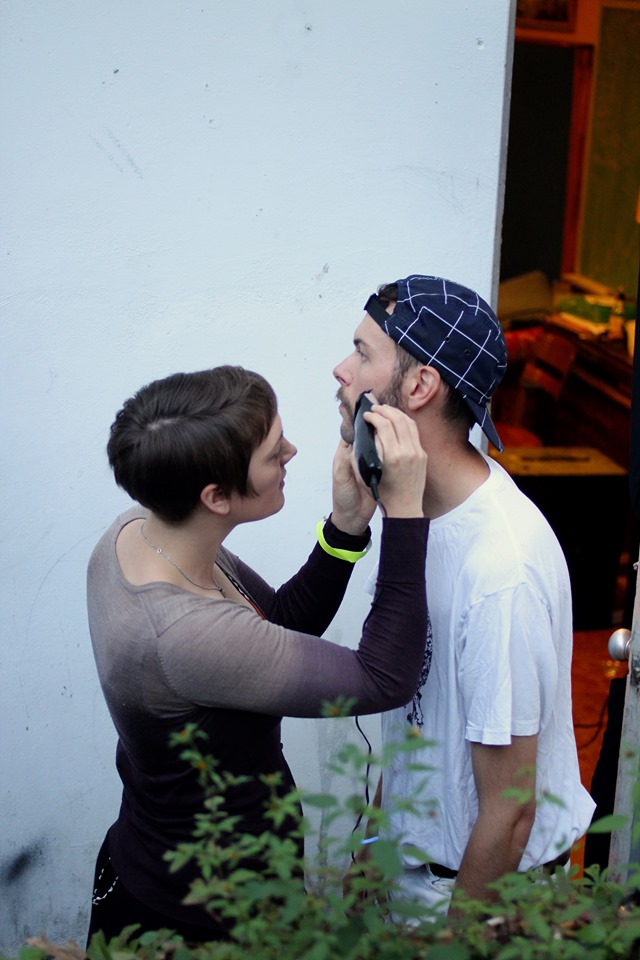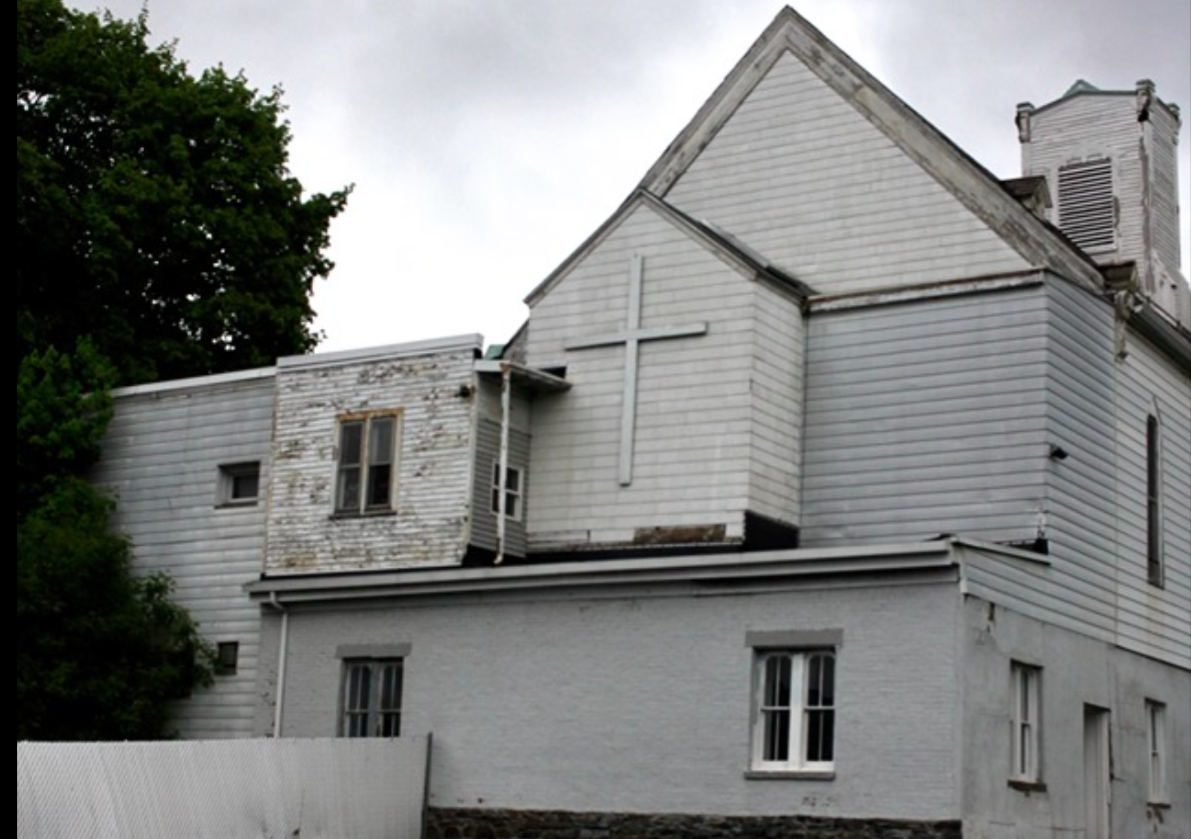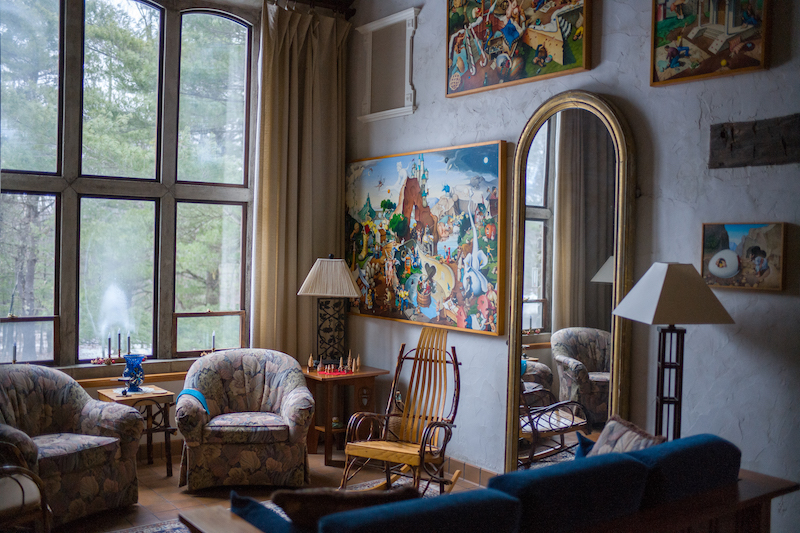Photos by Shannon Straney
Oakwood Community Center’s unassuming name and look—an old, white church with a midcentury annex and a small sign, sited amid a sea of asphalt on Hoosick Street in Troy—belies the variety of intriguing uses the complex accommodates.
There’s a recording and rehearsal studio, Swordpaw Music, where bands like Bear Grass and Front Biz regularly practice. There’s a once-a-week food pantry and a once-a-month, pay-whatever-you-want dinner prepared by guest-chef volunteers (in April, Emma Willard School students made manicotti). There’s a bookkeeping cooperative. There are concerts you’d actually want to see. There are birthday parties and music classes for kids. There’s a long-running speaker series named after a socialist revolutionary. And—fittingly, since the space served as an active Presbyterian church until late 2010—there are worship, prayer and Bible study meetings offered by several congregations.
The above catalog is not exhaustive—that’d be difficult, if not impossible, given the nonprofit center’s fluid mix of one-off events, “residencies” for organizations that align with Oakwood’s mission (“to bring neighbors together and build bridges among grassroots organizations” in Troy), and periodic meetings of other groups. The center recently hired its second part-time employee, an outreach and volunteer coordinator whose job, board chair Shanna Goldman says jokingly, will include knowing “all the people who are using the space at any given time.”

The busyness is kind of part of the plan, according to Goldman, who has a background in community organizing. “What I see us trying to be is a space that’s available,” she says. “I think, for me, the agenda is, ‘Have many different people in the building and, hopefully, find ways for them to interact, and then start to get to know each other, and then start to care for each other, and then…start to fight for each other.’”
The center’s premises, though larger than it seems from the street, limits this agenda, to an extent. There’s no space for a gym—an in-demand amenity—and the building recently proved too fragile and understaffed to accommodate the practice regimen of a local dance team. The parking lot is tiny, which doesn’t exactly bode well for a destination that abuts an arterial known for its inhospitality to pedestrians.
Potential capital improvements—and potential campaigns to fund them—abound. Parts of the patterned, slate roof need patching, and the gutter system needs to be replaced. The kitchen could be upgraded to a commercial-grade facility. The sloped side yard features a compost bin and not much else. Pews greenlit for removal by the center’s board still occupy the sanctuary space, constraining its versatility.
“We do very little to ask for money of people…and people give,” says Goldman. “So I think there’s a lot more potential once we are more organized about our asking.”
When the Oakwood congregation disbanded, many members joined First United Presbyterian Church, located on Fifth Avenue in downtown Troy. Over the years, that church and its governing body have helped to support the fledgling community center financially, according to First United’s current pastor, Rev. Gusti Linnea Newquist.
Rev. Newquist is heartened by “the real ownership of Oakwood…among people who would never step foot in a church,” she says, adding that the center’s activities seem to her to be “rooted in a sense of spiritual wholeness.”
First United now is undergoing a transition of its own. Two of the three buildings that make up its complex are slated to be sold, pending approval from the state Attorney General’s office, as is required, to an engineering firm that specializes in historic preservation. First United will keep the main sanctuary building for church activities.
This pragmatic disposition, which has “freed us up as a congregation to be a congregation, instead of being landlords,” Rev. Newquist says, indirectly underscores the improbability of Oakwood Community Center’s continued existence. (The Oakwood property is still owned by the Presbytery, but the center hopes to buy it this year, according to Goldman.) It’s easy to imagine an alternate history in which the late Victorian structure was razed to make room for yet another car lot or chain store, which unfortunately seem more suitable than a community center for the traffic-clogged Hoosick corridor.
These days, millennials are looking for community dinners, clothing swaps and child-friendly places that encourage social connections, says Linda O’Malley, Oakwood’s founding executive director, who retired in mid-2017 but still helps to run the food pantry. “And they’re starting to see, ‘Oh, this is what churches used to do.’”

American church membership has declined by about 20 percent over the past two decades, according to a recent Gallup poll, and millennial “membership rates are exceedingly low and appear to be a major factor in the drop.”
“Might this be a model for other congregations when they find that they can no longer sustain themselves as congregations?” Rev. Newquist asks, recalling questions that arose around the time of the Oakwood congregation’s end and the community center’s incipience. “Is this perhaps where the spirit is leading?”
The Oakwood experiment, though far from conclusive and still in need of further funding, suggests an affirmative answer to both of those questions.
Oakwood will host Soul Cafe a community dinner with a suggested donation of $3.00 on May 20. The meal will be served by Girl Scout Troop 1303.





